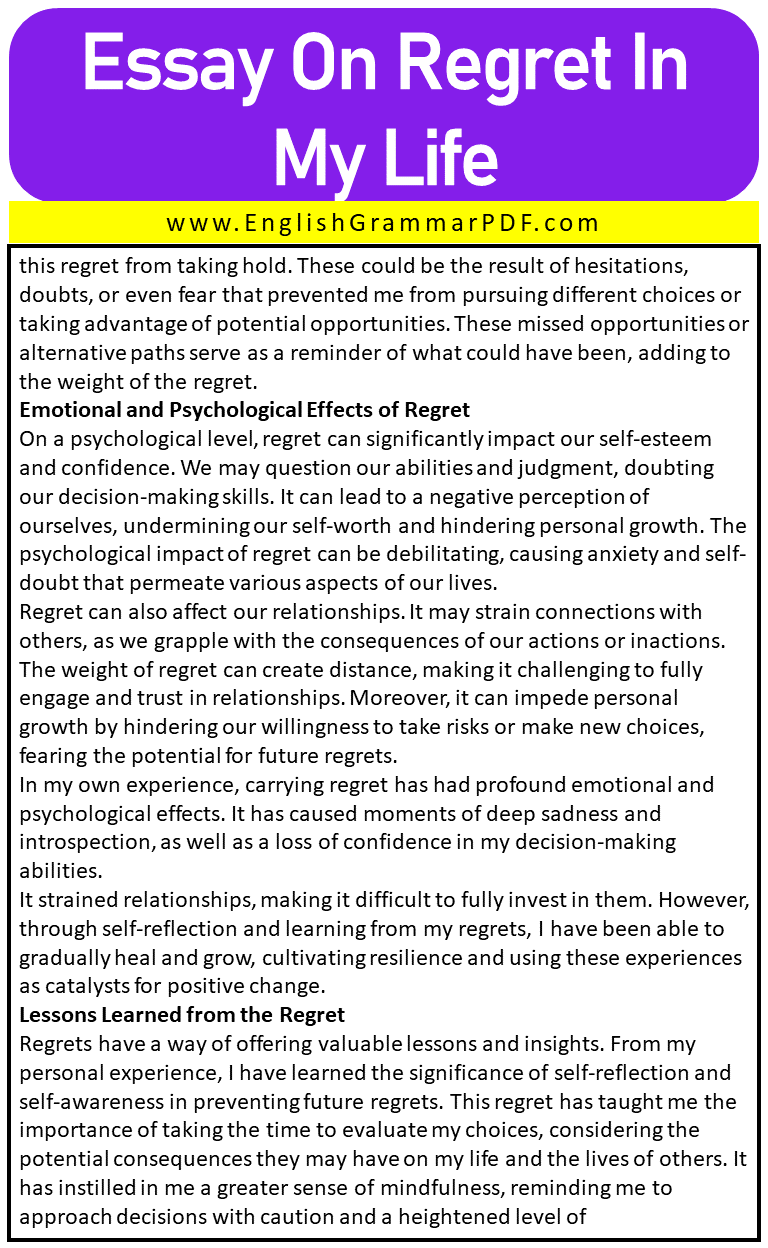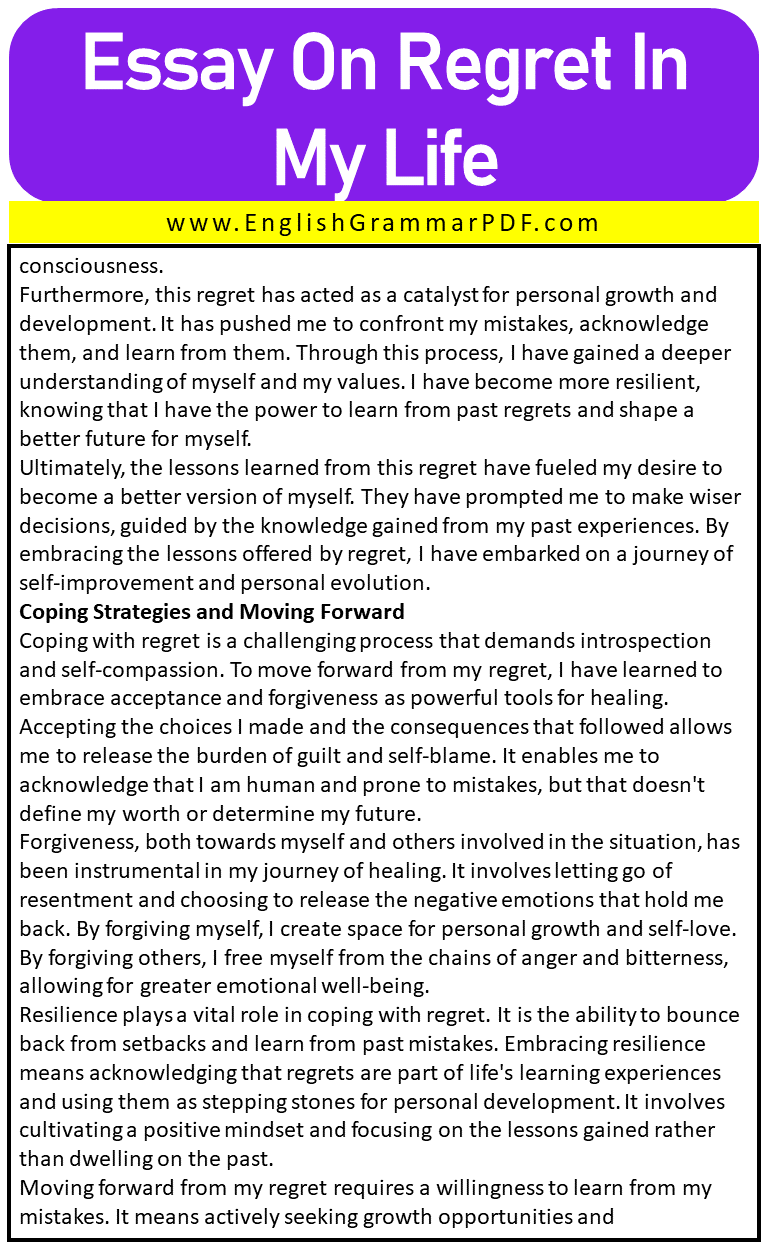Essay On Regret In My Life
Outline of Essay:
- Introduction
- Causes and Factors Leading to the Regret
- Emotional and Psychological Effects of Regret
- Lessons Learned from the Regret
- Coping Strategies and Moving Forward
Introduction
Regret is a powerful emotion that can haunt us for years, causing us to reflect on the choices we made and the paths we didn’t take. It is an inevitable part of the human experience, reminding us of our fallibility and the consequences of our actions. In my life, there is one particular regret that has lingered in my mind, leaving a lasting impact on my journey. It was a turning point, a crossroad where I made a decision that had far-reaching implications. The significance of this event lies in the fact that it altered the course of my life profoundly. Looking back, I remember the mixed emotions and thoughts that flooded my mind when I first reflected on this regret. It was a combination of remorse, sadness, and a deep sense of missed opportunities.
Causes and Factors Leading to the Regret
The regret that has lingered in my mind for years is not an isolated incident but rather a result of various causes and factors. Firstly, it stems from personal choices and decisions that I made, which contributed significantly to the development of this regret. It was the culmination of a series of actions that led me to the pivotal moment I now regret. Upon reflection, I recognize that my choices were influenced by my values, beliefs, and personal circumstances at that time.
In addition to personal choices, external circumstances, and influences also played a role in shaping the outcome that led to this regret. These external factors could range from societal pressures and expectations to the influence of friends, family, or significant others. The context in which the regret unfolded cannot be separated from the decision-making process.
Moreover, when reflecting on the regret, I cannot help but think about missed opportunities and alternative paths that could have prevented this regret from taking hold. These could be the result of hesitations, doubts, or even fear that prevented me from pursuing different choices or taking advantage of potential opportunities. These missed opportunities or alternative paths serve as a reminder of what could have been, adding to the weight of the regret.
Emotional and Psychological Effects of Regret
On a psychological level, regret can significantly impact our self-esteem and confidence. We may question our abilities and judgment, doubting our decision-making skills. It can lead to a negative perception of ourselves, undermining our self-worth and hindering personal growth. The psychological impact of regret can be debilitating, causing anxiety and self-doubt that permeate various aspects of our lives.
Regret can also affect our relationships. It may strain connections with others, as we grapple with the consequences of our actions or inactions. The weight of regret can create distance, making it challenging to fully engage and trust in relationships. Moreover, it can impede personal growth by hindering our willingness to take risks or make new choices, fearing the potential for future regrets.
In my own experience, carrying regret has had profound emotional and psychological effects. It has caused moments of deep sadness and introspection, as well as a loss of confidence in my decision-making abilities.
It strained relationships, making it difficult to fully invest in them. However, through self-reflection and learning from my regrets, I have been able to gradually heal and grow, cultivating resilience and using these experiences as catalysts for positive change.
Lessons Learned from the Regret
Regrets have a way of offering valuable lessons and insights. From my personal experience, I have learned the significance of self-reflection and self-awareness in preventing future regrets. This regret has taught me the importance of taking the time to evaluate my choices, considering the potential consequences they may have on my life and the lives of others. It has instilled in me a greater sense of mindfulness, reminding me to approach decisions with caution and a heightened level of consciousness.
Furthermore, this regret has acted as a catalyst for personal growth and development. It has pushed me to confront my mistakes, acknowledge them, and learn from them. Through this process, I have gained a deeper understanding of myself and my values. I have become more resilient, knowing that I have the power to learn from past regrets and shape a better future for myself.
Ultimately, the lessons learned from this regret have fueled my desire to become a better version of myself. They have prompted me to make wiser decisions, guided by the knowledge gained from my past experiences. By embracing the lessons offered by regret, I have embarked on a journey of self-improvement and personal evolution.
Coping Strategies and Moving Forward
Coping with regret is a challenging process that demands introspection and self-compassion. To move forward from my regret, I have learned to embrace acceptance and forgiveness as powerful tools for healing. Accepting the choices I made and the consequences that followed allows me to release the burden of guilt and self-blame. It enables me to acknowledge that I am human and prone to mistakes, but that doesn’t define my worth or determine my future.
Forgiveness, both towards myself and others involved in the situation, has been instrumental in my journey of healing. It involves letting go of resentment and choosing to release the negative emotions that hold me back. By forgiving myself, I create space for personal growth and self-love. By forgiving others, I free myself from the chains of anger and bitterness, allowing for greater emotional well-being.
Resilience plays a vital role in coping with regret. It is the ability to bounce back from setbacks and learn from past mistakes. Embracing resilience means acknowledging that regrets are part of life’s learning experiences and using them as stepping stones for personal development. It involves cultivating a positive mindset and focusing on the lessons gained rather than dwelling on the past.
Moving forward from my regret requires a willingness to learn from my mistakes. It means actively seeking growth opportunities and making conscious choices that align with my values and aspirations. By incorporating these coping strategies into my life, I have gradually freed myself from the grip of regret and paved the way for a more fulfilling and purposeful future.
FAQ’s
What is the most common regret?
The most common regret is often related to not pursuing one’s true passions and dreams, sacrificing personal fulfillment for the sake of practicality or societal expectations.
What is an example of deep regret?
An example of deep regret could be a missed opportunity to reconcile with a loved one before their passing, leaving a lasting feeling of remorse and longing for closure.
Explore More Essays:
Download the PDF of the Essay:







